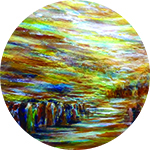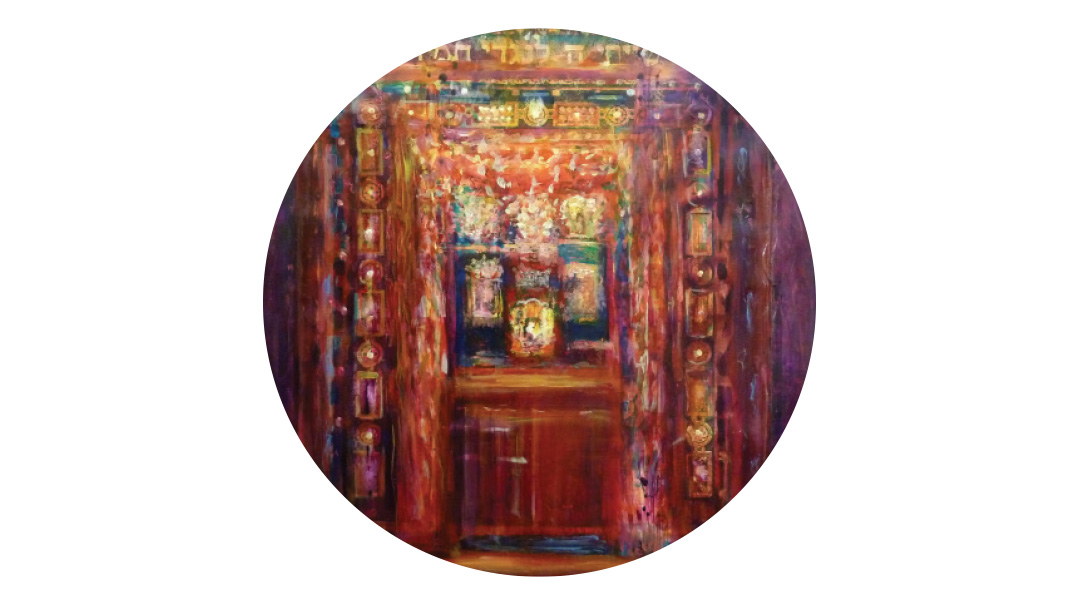Mirror Image


Why is it that when we face a windowpane we see through the glass to the other side yet when we face a mirror we see a reflection of ourselves?
The fundamental difference between a windowpane and a mirror is that the glass of a windowpane is clear while the glass of a mirror has been coated with silver aluminum or other metals. Very simplistically stated the reason we see a reflection of ourselves in a mirror is because while light can travel through the clear glass of the windowpane it cannot travel through the metal coating of the mirror nor can it be absorbed by the metal coating. Therefore light bounces off the surface of the metal and returns to our eye causing us to see ourselves instead.
As we know everything in the physical world has a parallel in the ruchniyus world.
The story is told of a rav who asked a wealthy individual for a contribution to benefit an impoverished family. The wealthy man refused. The rav led him to a window and asked him to describe what he saw. The man replied that he saw people walking in the street and children playing in a garden. The rav then led the man to a mirror and again asked him to describe what he saw. The man replied that he saw himself.
“The window and the mirror are both made of glass” the rav said. “When you looked through the clear window you were able to see other people. But when you looked through the glass coated with silver — a desire for money — you could see only yourself.”
A Clear View
We all view the world through different types of glass. The clearer the glass the greater our ability to see beyond ourselves and focus on others. The more the glass is coated with our personal desires and biases the more we focus on ourselves and our own interests.
The pasuk states: “Anochi omeid bein Hashem u’veineichem — I [Moshe Rabbeinu] am standing between Hashem and you” (Devarim 5:5). The mefarshim offer a homiletic explanation of this pasuk explaining that it is the “anochi” — being absorbed and obsessed with oneself and one’s desires — that stands in the way serving as a barrier between a person and Hashem and between the person and other people preventing him from truly connecting with others. (Heard from Rabbi Paysach Krohn based on Iturei Torah quoting sifrei chassidus)
How often do we listen to another person’s woes and chime in with what we went through instead of focusing completely on the speaker? How often while speaking to a friend are we already planning our response so that we’ll sound intelligent compassionate or witty? How often do we witness someone else’s success and instead of feeling happy for the other person we focus on dreaming that we had the same success?
By nature people are self-centered. We’re all born focused on ourselves and our own needs. A newborn is the epitome of self-centeredness. His entire world revolves around satisfying his needs. He isn’t at all concerned about waking his mother numerous times a night!
Rav Shimon Shkop explains that as the infant develops into a toddler his sense of “ani” broadens. He begins to think about his parents and siblings as an extension of his “ani.” As he develops into a child and then into an adolescent his “ani” broadens even more to include his extended family and friends. As we grow and mature in our adult life our goal is to broaden our “ani” to include our block our shul our community our city and eventually all of Klal Yisrael.
The greater the person the broader and more inclusive is his definition of “ani.” The “ani” of a gadol b’Yisrael encompasses all of Klal Yisrael.
Broadening Our Horizons
What can we do to broaden our “ani” to include more people?
Rav Eliyahu Eliezer Dessler in his well-known Kuntres Hachesed relates the word ahavah to the word hav to give and explains that when a person gives to someone he grows to love him. The more he gives the more he loves. Just as a mother loves her children because she is constantly giving to them she can grow to love other people by giving to them as well. Why? Because when one gives to another person he is giving something of himself. The other person becomes an extension of himself.
I used to wonder aren’t these approaches to broadening the “ani” an expression of self-centeredness? “I love myself and I love you because you are part of me.” Why is that considered an elevated mindset to which we should aspire?
Recently I began to understand this concept more deeply. The Vilna Gaon in his sefer Even Sheleimah cautions a person to work with his nature instead of against it as he engages in his life’s mission of improving his middos. He quotes the gemara (Shabbos 156a) that a person born under the mazel maadim will have the inclination to spill blood. What should he do? He can either become a murderer or he can sublimate his nature and become a shochet or a mohel.
Since the nature of a person is to care primarily about himself it would appear that based on the above principle we should work with our nature and sublimate it. Rather than negating our “ani ” we can broaden its parameters to include more and more of Klal Yisrael thereby becoming the kind and loving person that Hashem wants us to be.
During the infamous 1913 Beilis trial the prosecution attempted to prove the Jewish People’s disdain for non-Jews by citing the gemara (Yevamos 61a) “Atem kruyim adam — You Klal Yisrael are called Adam and the other nations are not called Adam.” Rav Meir Shapiro explained the gemara to mean that all of Klal Yisrael is like one person part of one whole. Just as the entire body feels the pain of one small finger that hurts so too everyone in Klal Yisrael feels the other’s pain as evidenced by Jews all over the globe rallying around Mendel Beilis in an effort to help him.
Our life’s mission is to adjust our view of the people around us and come to view them not as outsiders but as extensions of ourselves.
We Are All One
The story is told of a rebbe who imposed on himself a personal galus to refine his middos. He wandered from town to town enduring deprivation and hardship hiding his true stature. After a year he felt ready to return home. As he approached his hometown he was greeted with the distressing news that his son Moishele was ill. The distraught rebbe hurried home anxious to hear about his son’s medical condition.
“The person who greeted you was mistaken” his wife told him. “Our Moishele is fine baruch Hashem. Our neighbor’s son is the Moishele who is ill.”
A wave of relief engulfed the rebbe but a few moments later he announced to his family that he had to go back into galus.
“Why?” they asked in disbelief. “You just came home.”
The rebbe explained: “When I heard that our Moishele was sick I was beside myself with worry. When I found out that it was another Moishele I was so relieved. Then I realized if I don’t feel the same anguish for another child as I do for my own I must go back into galus to continue working on myself.”
We are nowhere near the lofty level of this rebbe. His example can inspire us however to make a serious effort to view other people as an extension of our “ani.” As the Nefesh Hachayim explains the only reason our enemies were able to destroy the Beis Hamikdash was because its spiritual essence was already destroyed by our aveiros. By training ourselves to view every Yid as part of the “Adam” of Klal Yisrael and by working on ourselves to broaden our “ani ” we can reverse the cheit of sinas chinam that has kept us in this long and difficult galus and be part of the rebuilding of the Third (and final) Beis Hamikdash.
Oops! We could not locate your form.







